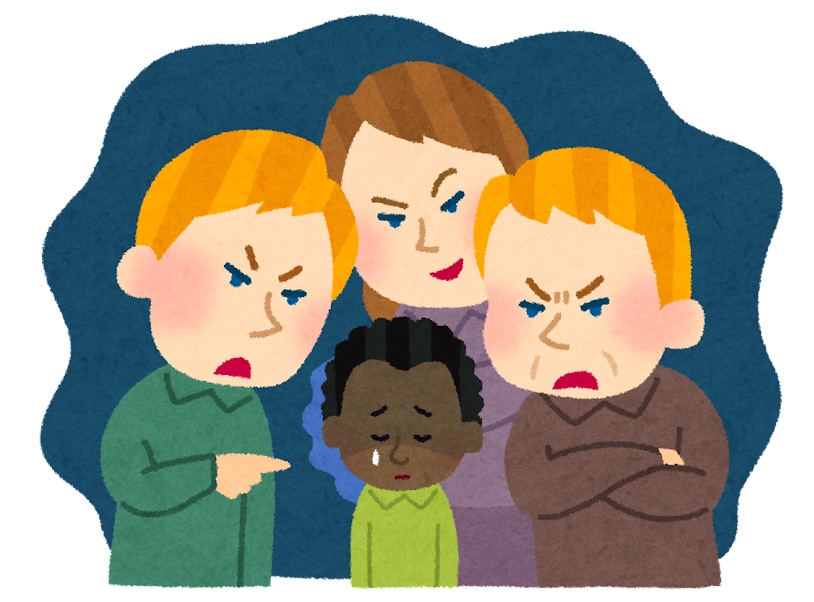Although racism is recognized as a problem that occurs worldwide, it actually exists in Japan as well. However, it is not often raised as a problem in Japan due to the low awareness of racism among Japanese people. Nevertheless, there are certainly people who suffer from racism. This article introduces the history of racism in Japan.
Racial Discrimination in Japan
People of various ethnicities and races live in the world. Although they live in different countries and regions and have different origins, they are all the same human beings. Language, culture, religion, and ideology differ depending on the environment in which we are born, and these differences are free and should be accepted and acknowledged by each other. If they are dangerous ideas, it is necessary to confront them and work to improve them, rather than to ostracize them. In today’s globalized world, the issue of racism is especially important. If we make distinctions and ostracize people because of their race, language, culture, or way of thinking, we will not be able to live hand in hand with the world as a whole. On the contrary, discrimination will be rampant, and even hatred will be the result. This is true not only between nations but also within nations.
Racial discrimination occurs even in developed countries, such as the relationship between whites and blacks in the U.S. and the problem of immigrants in Europe. Japan is no exception. There has been discrimination in Japan throughout history, but there is also discrimination due to race. Japan is considered by the rest of the world to be a country with low awareness of racial discrimination, and efforts to eliminate racial discrimination are lagging behind.
History of Racial Discrimination
Discrimination exists throughout the world, but it also exists in Japan. It includes gender issues such as discrimination against women, human rights against children and the elderly, and human rights against people with disabilities, HIV, leprosy, and other infectious diseases.
These are still problems in Japan, and correct knowledge, education, and measures to eliminate discrimination are required. However, these are examples of various types of discrimination and are different from racial discrimination. Racial discrimination in Japan can be divided into three main categories: (a) Ainu People’s Human Rights Issue; (b) The Dowa Issue; and (c) The Foreigner’s Human Rights Issue. These are deeply rooted in history and still occur in various places, including some areas in Japan.
Discrimination Against the Ainu People
The Ainu people, who as of 2020 still live mainly in Hokkaido, were originally indigenous people who hunted, fished, and gathered food in the area. Hokkaido used to be uncultivated land inhabited by the Ainu people, not Japanese territory, but was invaded by the Japanese from the 15th century onward. In response to the invasion, the Ainu rose up against the invaders in 1669 under the leadership of Shakushain, but were outnumbered by the Tokugawa Shogunate’s reinforcements to the Matsumae Clan and the provision of weapons and food, leading to their surrender through Shakushain’s conspiracy to kill them.This is called the Battle of Shakushain, after which the Ainu were allowed to further invade the Japanese. In the Meiji era (1868–1922), the Ainu people were subjected to a one-sided assimilation policy that led to the abolition and deprivation of all their previous lifestyles. The Ainu people, who were positioned as former natives, were exploited and oppressed under the guise of protection under the law, and discrimination against the Ainu people by the Japanese people was intensified by the rapid increase in the number of immigrants called Tondenbei, who came to Hokkaido for the purpose of settling the area. The “Law for the Protection of the Ainu People of Hokkaido,” enacted in 1899 under the guise of protecting the Ainu people, was severely criticized both at home and abroad, and was repealed, and a new “Law Concerning the Promotion of Ainu Culture and the Dissemination of Knowledge and Awareness of Ainu Traditions” was enacted. However, the law did not mention the Ainu people’s right of prior residence, which they demanded, and the enactment of the law did not immediately eliminate discrimination against the Ainu people on an individual level.
In fact, there are still people who say they have experienced discrimination in their daily lives, such as labor, employment, love, marriage, and school.
Discrimination Against Foreigners
People from various countries come to Japan as workers, students, and tourists.
Some come because they are attracted to the culture and climate of Japan, while others stay in Japan as migrant workers. Although this is a natural scene in a globalized world, there are still cases of people being denied residency and or employment because they are foreigners, or being harassed because they are half-Japanese or quarter-Japanese. There are Japanese who do not have prejudice or discrimination against them. However, this problem is a real phenomenon, even if it is only a part of the problem. Hate speech and other forms of discrimination against people of a certain ethnicity, race, or nationality are hurting the dignity of foreigners who visit Japan. In Japan, communication is mainly in Japanese, and people often communicate only in their native language.
On the other hand, many people overseas can speak two or more languages, such as English, in addition to their native language, and most people are comfortable communicating in English even when visiting other countries. For such people, Japan, where they can only speak Japanese, may in a sense become a country where it is difficult to communicate. There is also a tendency among Japanese people to shun foreigners who cannot speak Japanese. This kind of miscommunication often leads to mutual incomprehension and discrimination. Since there are many people who strive to understand each other, discrimination may occur only in part, but the spread of hate speech by some of these people may encourage discrimination. Alternatively, there may be some mean-spiritedness due to the historical discrimination that Japanese people have suffered.
As of 2022, some countries still discriminate against people because they are Japanese. It is said that even as of 2022, in some countries, people may still be discriminated against for being Japanese, and in some areas, an environment in which discrimination invites discrimination may have been constructed.




Comments